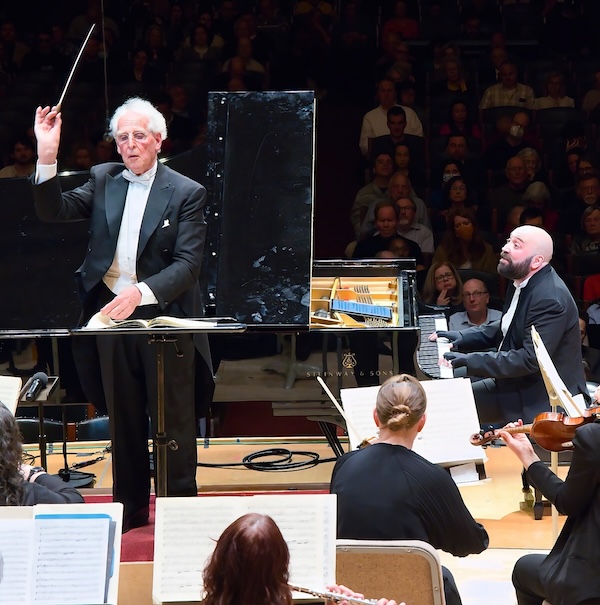Boston Philharmonic closes with intimate Mozart and majestic Bruckner

Alessandro Deljavan performed Mozart’s Piano Concerto No. 24 with Benjamin Zander and the Boston Philharmonic Orchestra Friday night at Symphony Hall. Photo: Hilary Scott
On Friday night, the Boston Philharmonic under Benjamin Zander delivered the final concert of their 45th season at Symphony Hall. The program of Mozart and Bruckner spanned two hundred years of Austrian musical tradition —a fitting end to a season of intense and ambitious programming.
Friday’s program featured two composers who bookend the Austrian classical symphonic tradition. Wolfgang Amadeus Mozart, with Franz Joseph Haydn, developed the forms of the string quartet, symphony, and concerto that catalyzed a tradition of Austr-German composition. The lush, harmonically grand style of Anton Bruckner—while a far cry from the music of his 18th-century predecessors—attends to the formal practices that gave it birth.
In spite of their differences in scale, the pieces on the program—Mozart’s Piano Concerto No. 24 in C minor and Bruckner’s Symphony No. 9—complemented each other well. Both pieces are in minor keys, written late in the careers of their respective composers, and scored for complex ensembles. Further, both works have a melancholic self-awareness and irony that made for a program of pathos and intensity.
In the Mozart concerto, Alessandro Deljavan was the evening’s soloist. Deljavan brought a delicate virtuosity and unimpeachable technique to the concerto. Zander’s accompaniment, while clear and precise, was occasionally at odds with Deljavan’s more expansive phrasing. However, this emphasized the tension inherent in the piece between soloist and ensemble, making for a compelling dialogue between the orchestra and Deljavan.
While the ensemble of strings was perhaps too large, and thus inhibited the dynamic shapeliness of the performance, the orchestra in general performed the Mozart with grace and sensitivity to both work and soloist.
In the intimate Larghetto, Deljavan floated the simple melody, which was taken up by the ensemble. The final Allegretto, a theme and variations, seemed to make way for the Bruckner as its harmonies and thematic variations accumulated. Deljavan’s rubato suited the increasing density of the concerto, which he brought to an exciting conclusion.
Deljavan favored an appreciative audience with a deeply felt encore of Schubert’s Allegretto D 915 in C minor, which nicely linked the high Classicism of Mozart with the late Romanticism of Bruckner.
Bruckner’s uncompleted Ninth Symphony is an endeavor at over an hour in length long and a feat of athleticism for the entire orchestra, especially the brass and strings. The unfinished symphony in D-minor also poses interpretive challenges for the conductor, as the work’s long movements, thematic repetition, and massive dynamic scale make for a piece easily lost in its own enormity.
In the face of all challenges, the orchestra performed spectacularly: from their first entrance, the brass—led by principal horn Kevin Owen, principal trumpet Andrew Sorg, and principal trombone Gregory Spiridopoulos—let forth a gorgeous sound in perfect unison, which made the hall ring. Though the orchestra was heard at its full strength within minutes of the symphony’s opening, it did not inhibit the piece’s intensity as Zander drove the first movement to a thrilling conclusion.
The Scherzo was perhaps the highlight of the evening, with the strings switching deftly between the intensity of the opening motifs and the sprightliness of the Mozartian second theme. As Zander guided the orchestra through these shifts, his intuition for Mahler and music of the late 19th century in general was evident.
The final movement of the unfinished symphony is an aching slow movement that marries the harmonic glories of Bruckner’s style with a deep sense of emotional vulnerability. The pained lyricism of strings and winds gave way in the end to a pristine final chord in the horns—a fitting conclusion both to this survey of a fundamental musical tradition and an excellent season.
The Boston Philharmonic Youth Orchestra will perform a program of Schumann and Mahler May 3 at Symphony Hall. bostonphil.org
Posted in Performances
Posted Jun 29, 2024 at 11:31 pm by James Nimmo
I have to listen on the live streaming service which I’m glad the BPO provides.
This orchestra plays so well, being part-time does not detract from its quality.